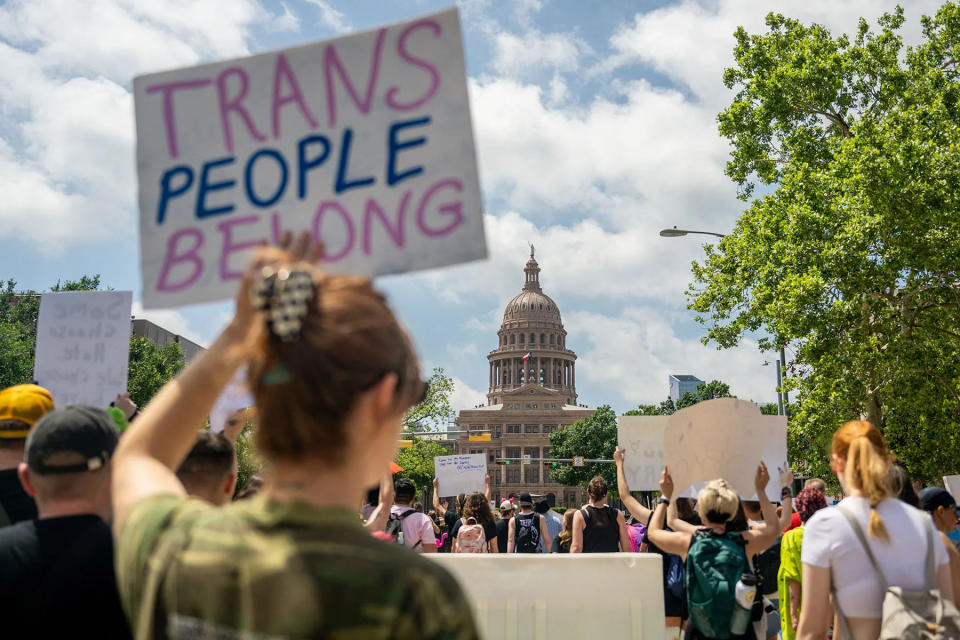Many trans Americans live in fear, but LGBTQ+ advocates see a reprieve in statehouses.

Marchers carry signs as they walk through the French Quarter in New Orleans for Transgender Day of Visibility on March 31, 2023. (Greg LaRose/Louisiana Illuminator)
Getting a new doctor. Holding hands. Walking into a bar. Using a public bathroom. These everyday situations have become fear-inducing for over 60% of transgender Americans, according to new polling from the left-leaning firm Data for Progress.
Amid a growing effort by far-right politicians and conservative policy groups to curb LGBTQ+ rights — a movement built on targeting transgender people with hostile legislation and rhetoric — this hostility is taking its toll on trans Americans’ sense of safety.
This report was originally published by The 19th. The Illuiminator is a member of The 19th News Network.
However, a political shift in anti-LGBTQ+ legislation may be under way. The Human Rights Campaign and several state advocacy groups believe the tide is turning against anti-LGBTQ+ bills. Florida and West Virginia ended their legislative sessions passing only a single bill each, and Georgia Republicans failed to pass any anti-LGBTQ+ bills this session. Kentucky is likely to be next on the list of states to block all of its anti-LGBTQ bills, as the state’s general assembly did not advance any such legislation in time to meet its deadline for veto-proof bills.
Advocates in these states feel profound relief, and sense a possible return to legislative focus on other initiatives. Some advocates also say that, despite the clear difference between this year and last year in terms of the number of anti-LGBTQ+ bills being signed into law, they’re not out of the woods yet.
“I’m cautiously optimistic,” said Chris Hartman, executive director of the Fairness Campaign, a Kentucky LGBTQ+ advocacy group. “This could be a return to where we were before the anti-trans rhetoric reached a fever pitch nationwide.”
Prior to 2022, Hartman said, Kentucky had not passed such a bill for almost a decade. But as Florida and Texas dominated the news cycle with anti-trans political attacks, that rhetoric spread to other Southern states — including his own.
Last year, Kentucky passed arguably the most extreme anti-trans law in the country. Within a single law, the state banned students of all ages from being taught about gender identity or sexual orientation, banned students from using restrooms that match their gender identity, banned gender-affirming care for trans youth and banned students up to the fifth grade from learning about human sexuality and development.
This year, the state passed zero anti-LGBTQ+ bills — which left Hartman in disbelief as the final gavel before veto recess in Kentucky’s General Assembly fell in late March. This was an incredibly challenging legislative session, he said, and it felt like anti-LGBTQ+ legislation was on a swift trajectory as Republicans pushed to expand the state’s religious freedom law, ban public drag performances and allow doctors to refuse treatment based on religious or moral grounds.
“It is a surprise to all of us, including me, that we have made it to the veto period of the legislative session without any of these anti-LGBTQ+ bills moving forward,” he said. Hartman was in the Kentucky House gallery until midnight on March 28 when legislators gaveled out, waiting to see whether any of the bills would get through.
“It was a nail-biter up to the very last minute … it wasn’t until 11:30 p.m. that I was like, oh my gosh, we really are going to make it,” he said.
In Georgia, advocates were also fighting anti-LGBTQ+ bills until the final hours of the legislative session in late March. Ultimately, none of those bills passed or even made it to a vote in the Georgia House, despite Republican majorities in both chambers.
Jeff Graham, executive director of Georgia Equality, was still at the state house at one in the morning on March 29 with around 25 to 30 people — the majority of whom were transgender Georgians and the parents of transgender kids. Many of them had been there all day long and were working intensely to meet with lawmakers, Graham said. After it was over, the relief and exhaustion in the group was palpable. They had just fought the largest number of anti-LGBTQ+ bills ever introduced in one legislative session in Georgia, Graham said.
In the last three weeks of Georgia’s legislative session, Republicans started overhauling unrelated bills — one on overdose remedies and another on student athletes’ mental health — in attempts to pass bathroom bans and bans on gender-affirming care for trans youth.
Although adding amendments into unrelated legislation is fairly common practice among both political parties in the state, Graham saw the efforts as a sign that Republicans know they don’t have broad public support for anti-LGBTQ+ legislation; particularly since such changes aren’t always reflected in a bill’s title or basic summary, and they were made without opportunities for public comment.

People march to the Texas State Capitol during a Queer March demonstration on April 15, 2023 in Austin, Texas. (Brandon Bell/Getty Images)
“What it really does say to me is they know that these are not popular, and they’re trying to do it without drawing a lot of attention to it,” he said.
Graham believes that, among the swing seats in the state House, some Republicans were concerned about having to take a vote on anti-LGBTQ+ bills and to be held accountable for their vote during the November elections. He also believes that emotional testimony from parents of transgender youth helped to move lawmakers on the issue and kept bills from advancing.
Meanwhile, in Florida, 21 out of 22 anti-LGBTQ+ bills were blocked this legislative session. Nadine Smith, executive director of Equality Florida, attributes that blockade in part to LGBTQ+ constituents visiting the state house week after week to explain the harm that the bills would cause. Those conversations played a large role in convincing lawmakers not to prioritize these bills, she said.
Last year, Florida enacted six anti-LGBTQ+ bills into law — more than the previous seven years combined, the Human Rights Campaign said at the time. Florida has also issued anti-LGBTQ+ policies through state agencies rather than the legislature, signaling that the state is willing to push anti-LGBTQ+ policies outside of the legislative process. Recent examples include a rule issued by the Florida Department of Highway Safety and Motor Vehicles that prevents transgender people from updating their driver’s license.
In Kentucky, Hartman saw a swell of support from Republican lawmakers in February, during a House judiciary committee meeting on the proposed bill to expand the state’s religious freedom law. Six Republicans spoke up during the debate to express their support for protections against LGBTQ+ discrimination, he said — either by explicitly backing such protections or saying that they did not want to interfere with local city and county policies.
“Never before had that many sitting Republican legislators gone on the record, especially within 10 minutes, to say that they supported local LGBTQ+ discrimination protections,” he said. Some of the Republicans who spoke up already had supportive records, Hartman said, but others were a surprise.
Across the country, 59% of Republicans currently support nondiscrimination protections for LGBTQ+ people, according to the Public Religion Research Institute. That support among GOP voters decreased by seven percentage points from 2022 to 2023, as anti-LGBTQ+ rhetoric ramped up among Republicans running for office and more anti-LGBTQ+ bills were passed.
Still, most Americans — including most religious Americans — want LGBTQ+ people to be protected from discrimination, the poll found.
Republican lawmakers may finally be getting wind that anti-LGBTQ+ policies are not as popular as they believe them to be with their voters, advocates said. However, the anti-trans rhetoric fueling these laws has left transgender Americans afraid of being harassed by members of their own community.
Within the past year, 67% of transgender people have heard anti-LGBTQ+ remarks from family, friends, coworkers, and neighbors — and 39% have stopped speaking to a friend or family member that did not accept their LGBTQ+ identity, the Data for Progress poll found.
Around 870 LGBTQ+ adults took the online Data for Progress survey from March 8-14, 2024. That sample was weighted to be representative of the adult LGBTQ+ community by age, gender, education and race through the U.S. Census Bureau’s Household Pulse Survey data. The margin of error is ±3 percentage points.
Overall, transgender adults in the survey reported having more negative experiences in the past year than queer cisgender adults; they experienced more harassment online and in-person, and more trans people were discriminated against on the basis of their LGBTQ+ identity. Over a third of all LGBTQ+ adults said that they believed the quality of life for LGBTQ+ Americans in the past year has gotten worse.
Kirby Phares, senior analyst at Data for Progress, was struck by how many transgender people said they are unable to, or afraid to, access health care in the current political environment.
Nearly a quarter of transgender people — 24% — said that their access to gender-affirming medical care has been interrupted or discontinued in the past year as a result of anti-trans policies, while 54% said that it is currently difficult for them to access gender-affirming medical care in general. Twenty percent of trans people did not feel safe going to the doctor or hospital when they were sick or injured out of fear of mistreatment.
LGBTQ+ Americans’ mental health is also suffering in the current political climate, the Data for Progress poll found — especially for transgender Americans. More than half of LGBTQ+ adults, including 79% of trans adults, said that recent anti-LGBTQ+ policies and rhetoric have negatively impacted their mental health.
Even with the slowdown in places like Florida and Georgia, over a dozen anti-LGBTQ+ bills have passed out of state houses this year — the ACLU counts 16, while the Trans Legislation Tracker counts 21. Advocacy groups update their legislation trackers at different times, and categorize bills differently, which can cause discrepancies between their bill tallies. Thirteen of those anti-LGBTQ+ bills that passed have been signed into law so far, per the Trans Legislation Tracker.
Several of the bills restrict funding for gender-affirming care for transgender adults, ban gender-affirming care for trans youth, and create religious exemptions for LGBTQ+ nondiscrimination laws for employers and businesses. Others prevent trans students from using school restrooms and prohibit classroom discussions of LGBTQ+ issues.
Roughly 180 anti-LGBTQ+ bills are still advancing through state legislatures, according to the ACLU.
“We don’t know what will happen in all of those. We’re not out of the woods yet,” Graham said. “I think many of these bills will be back in 2025.”
The post Many trans Americans live in fear, but LGBTQ+ advocates see a reprieve in statehouses. appeared first on Louisiana Illuminator.

